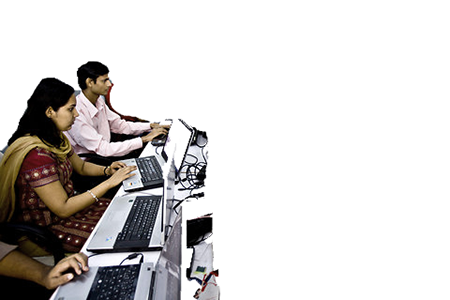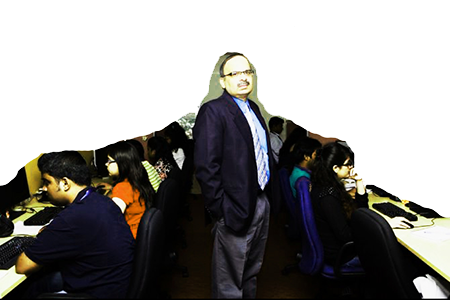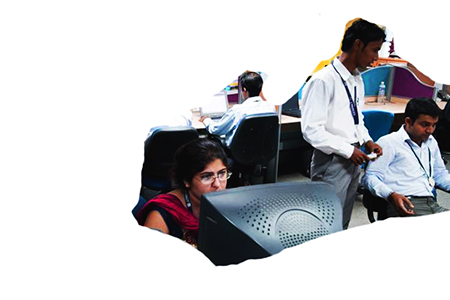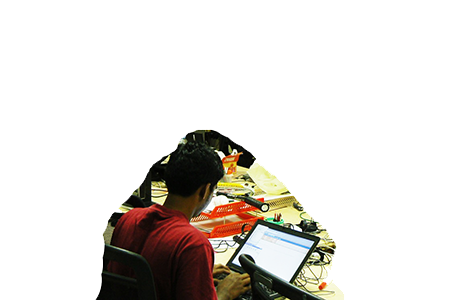Work in the Indian IT industry: freedom or slavery?

Globalization of the labor market-presented new questions of selection of employees. Chasing the most cheap labor companies in the US and Europe turned to Indian (Chinese, Russian, Ukrainian) information producers. The "demand" for Indian professionals turned as the internal structure of the labour market and the education system.
The changes that have occurred in India in the 2000s, was named the "Indian IT revolution." "Revolution" was accompanied by a rapid increase in the number of professionals employed in the IT industry (up today about a quarter of the total mass of workers) and by multiplying the total industry contribution to national GDP. In the end, the end of the 2000s, formed a situation in which a huge portion of India's population, getting a job in the office in Chennai or hitting a local "silicon valley" Bangalore, in reality performs work for clients from San Francisco or, for example, in new York.
How and by whom carried out such rapid growth? The conditions in which work the specialists of the future/non-workers of the early twentieth century? Below I will cite some testimonies of those who daily suffer in my own experience the "happy change" and those who are trying to invent ways of collective intervention in the situation. That is evidence of the prevalence literally murderous labor conditions in the software industry of India, as well as evidence of attempts to create a professional self-employees.
Information work and indignation
One of the opinions about the events in India was published in March 2013 K. Kahn, an IT worker at a firm developing software in Bangalore, member of the Indian Association of IT employees (ALLITEA), participant in the protests organized by the workers of the company HCL.
"the Neoliberal regimes in India, in several States including Central, regardless of the ideological position of the party in power, moved quickly to create artificial Islands "Knowledge workers". Including to separate them from other groups of workers involved in the struggle for their rights and interests. The recent protests of the employees of HCL, unfolded in front of the HCL offices in various parts of the country, showed that the number of IT-sector in India is growing. Unfortunately, up to this point, the workers themselves tried to collectively articulate their voice, to declare the use in this area. Protests of employees of HCL are just the tip of the iceberg, showing growth of perturbation among the employees of IT firms, irritation, intimidation, exploitation, etc. In a situation of deep global economic crisis, IT workers felt the pressure from so much beloved boss, now showed their "true" faces.
Question, do not leave me alone, is: Why did it happen that in India still there were no attempts to create trade unions or associations of employees of private companies, not only in IT industry but also in any associations of "white collar" in principle?
One of the answers to this question, shared by many, is the fact that the private sector "white collar" is paid and organizations strongly care about their employees. But the truth is that, at least in the IT sector, companies "give" their employees because of their own fear (of the government). The IT sector plays a significant resource of the national GDP. No company wants to risk, that is, adversely affect the growth of the industry (e.g. workers ' strikes).
A few months ago the media had spread the news. The Chairman of the Ministry of labour of the government of Karnataka has recommended to stop artificial inflation growth in IT, to cease to provide benefits to IT-companies. However, after a brief discussion, in the news, IT industry again continued to stretch.
A study conducted by NIMHANS in Bangalore, has presented shocking data: more than 36 % of technical specialists have serious mental disorders. 1 of 20 IT professionals think seriously about the possibility of suicide, according to NIMHANS. 27.6% of workers IT is dependent on various drugs. Suicide, health problems, conflicts in the family because of strong pressure at work and long, long working days as seriously distort relationships with family and friends, and the social fabric of society as a whole. The expression "Burned at work" became popular among workers in the IT industry and among employees working with a staff that never stops reinforced attempts to find new ways to motivate and raise the competitive spirit 14-18 hours of daily office work in the IT industry is deemed to be the norm. This figure can easily be checked anyone who doubts or denies such fact.
Anyone can find and read many stories about the suicides, opublikovannyh in the news. In some cases, the employee has committed suicide, leaving a note that blames his Manager, a chief in the act. And still nothing was done by the government to stop the destruction of society.
A few months ago the headlines of all major Newspapers announced the government's proposal to introduce biometric passports for all IT professionals. This idea was supported by the heads of the companies. If this is not slavery, what is it?
The only way out – the unification. But it is important to understand that in the current environment not all workers are able to join the Union or Association, to collectively speak out against exploitation and intimidation. Most of the workers afraid of immediate dismissal.
However, there were those who initiated the registration of the Association of IT professionals — All India IT Employee Association (for more information on the tasks and goals of the Association can be found on their the website). Among the basic requirements AllTEA: to draw the government's attention to the necessity of creating pension plans for workers in IT, providing employees with complete information about the companies in the industry (by publishing it on the official website of the Association), about working conditions in it (not just wages but also the level of employee satisfaction, conflict, irritation). We aim to develop a list of rules and requirements work with members, designed to protect and preserve the interests of employees. This list, approved by the government services, we will clearly define what is allowed and prohibited within the company".
The total number of members of the Association, declared himself the first independent trade Union Association in the field of IT in India today is about 10 000 people. The Central tasks of the Association include the adoption of the IT act and the social guarantees for all IT professionals (insurance, bonus, overtime payment etc.) Along with another Association – Union of employees in IT and ITES (UNITES) this Association represents a successful attempt of self-organization "specialists of the XXI century" in India.
Illusions, rivalry and suicide
That still does not suit the members of the professional associations? What they are not able to handle their own individual powers? And why IT so very susceptible to illusion of exclusivity?
The answers to these questions are partly complements and tells a different IT worker Gautama. A dismissed employee focuses much more attention on the relationship between managers and subordinates. The text offers critical analysis of the illusions of the IT revolution and corporate large modern IT companies. The system that the check is nothing more than disguised exploitation mechanism.
"what the IT revolution in India did indeed real, as it is spread among it people a false idea of themselves as the most worthy, the great and talented worker. In India in particular thanks to the reforms of Manmohan Singh, the number of employees IT has always exceeded the amount that was demanded by the market. This discrepancy affected the salaries remained low.
What are the structural changes that made possible this work well, "a machine for the production of money" (industry outsourcing)? A key figure of this machine is the figure of the Manager. The development of capitalism in the last couple of decades was accompanied and promoted the development of new theories of scientific management. The work of the Manager directly affects the welfare of the company and depends on it, whereas the payment of regular employees, producing "information" products has nothing to do with the actual level of profit earned by the company. Middle Manager level works well if each of his slave 100%, and more productive. Workers are facing each other, engaging in continuous struggle, competition for their own individual well-being. There is no sense of belonging to a single team, empathy, solidarity. All participants of the race – bitter rivals. The internal ideology of the company is built on the basis of extreme individualism, of personal success around. There are also managers that are managers, urging them and pushing. The whole system of power within the company looks like it is about a series of ongoing battles for survival.
It managers involves the use of a special dictionary. So, the individual usually acts for the Director as a simple "resource", interchangeable, and completely impersonal. People should value to pay for giving them the opportunity to work hard as an IT-specialist. Employees are required to respect the "values" of their own generous companies.
In India, most incoming outsourced orders rather elementary and does not require a high IQ or special skills. A standard worker, IT is necessary to be obedient, to be able to obey any individual impulse towards independence and work quickly suppressed. Training newly arrived, young, inexperienced professional is one of the key steps in the processing of a person that meets the requirements of the company. This training includes learning the language, gestures, posture work, the mode and means of food, recreation, etc. That is a full course on polishing a fighter for the future prosperity of the company (her superiors). Such initial investment in the beginner, it is vital for Indian companies. For vacancies, IT in India, the employee is expected according to only two basic requirements: knowledge of English and average academic achievement. This is the stereotype of a novice programmer.
Notions of privilege of IT is extremely exaggerated. It is difficult to name those who produce knowledge. The IT people in most cases just repeat the same operation, objectives, applying to all existing power and often being in the illusion that their work is amazing and free. They try to deny the fact of absolute substitutability and the fact that there are thousands of others waiting on this change.
Because of the fragility of the situation, any public act of discontent ends for the employee to immediate dismissal. There are thousands ways and the way of dismissal of an employee, and get rid of the "arrogant" employee absolutely no problem. Moreover, the dismissed employee immediately becomes subject to corporate policies, when they are a negative example for each "good" a creative IT professional. The current situation on the world market information management, allows to hope for increase of salaries in the industry of IT in India, receiving a large portion of orders from America for outsourcing models. What is the reason why the myth of their own exceptionalism and confidence in the future today are firmly rooted in the minds of IT workers? What can Wake them up? Questions to which no answer".
"Bharat was an honest, hard worker, with a wonderful family. But his honesty proved to be a huge weakness, which employers have successfully used. Bharat worked for one of the largest Indian companies, which all IT firms have promised their employees with special advantages: high wages and the opportunity to work abroad. "Special" benefits forcing employees to work round the clock: they were afraid to be fired and hoping to get a raise, a business trip abroad. In one of the weekends, driven by managers, Bharat worked continuously for three days until his heart stopped beating due to a heart attack. This case was presented as an incident that occurred because of personal inattention to their own health and personal greed (the pursuit of additional money).
In this situation it is impossible to prove the guilt of the individual Manager, as this type of behavior is "inspired by" the entire corporate ideology. Employees do not have the ability and time to incorporate, register your Union. They work throughout the day and night, producing products in accordance with the terms specified by the managers. While worker pay slightly above the cost of renting a tiny apartment, management takes the "cream", having an income several times higher than the salary of a developer".
***

So back to the question announced in the title of the article: what are today's IT workers in India? Who are they? The image of free, independent, creative worker, providing humanity with new knowledge, developing new advanced technologies seems to be too far from the portrait of IT professional, which offers us reality of the global market 2000-2010. Work in the field of IT is becoming more like work on a monotonous repetition of identical operations, tasks, requirements. Work, excluding the "free flight of thought" and uncontrolled production of knowledge, about which so often speak the theorists of cognitive capitalism.
Armed with the myth of their own "individuality" and/or fear of losing the "enviable" workplace, IT professionals are in constant tension: they must simultaneously be able to execute the work order and to maintain own knowledge and skills "in good shape", constantly tracking technological changes. In the result, the working operation becomes difficult to separate from the rest and displaces all other spheres of life. Lifestyle IT worker, private night work (largely due to the difference in time zones between countries) makes it impossible for normal communication and the support of family, friends and colleagues. Weekend, usually used in order to, finally, sleep (or work) and are often alone. Arriving at work on Monday, the man again appears as a easily replaceable resource of the company.
A long and diffuse work time, permanent unpaid processing, emotional exhaustion – here is the brief list of problems of IT industry in India (and other countries). Issues that should be publicly and collectively raised, not silenced in the thick walls of personal depression, fear and annoyance.
A. Kalk, trade Union IT.
The article is prepared on materials of sites www.thehindu.com, www.deccanherald.com, www.ciol.com. The texts of Indian workers are translations of published original articles.





Комментарии
Отправить комментарий